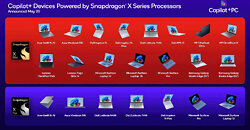- Joined
- Aug 19, 2017
- Messages
- 2,999 (1.07/day)
In an interesting exchange about product stance between Intel's interim co-CEO Michelle Johnston Holthaus and Qualcomm, both have offered conflicting statements about the market performance of Arm-based PCs. The dispute centers on customer satisfaction and return rates for PCs powered by Qualcomm's Snapdragon X processors. During the Barclays 22nd Annual Global Technology Conference, Holthaus claimed that retailers are experiencing high return rates for Arm PCs, mainly citing software compatibility issues. According to her, customers are finding that typical applications don't work as expected on these devices. "I mean, if you look at the return rate for Arm PCs, you go talk to any retailer, their number one concern is, wow, I get a large percentage of these back. Because you go to set them up, and the things that we just expect don't work," said Holthaus.
"Our devices continue to have greater than 4+ stars across consumer reviews and our products have received numerous accolades across the industry including awards from Fast Company, TechRadar, and many consumer publications. Our device return rates are within industry norm," said Qualcomm representative for CRN. Qualcomm projects that up to 50% of laptops will transition to non-x86 platforms within five years, signaling their confidence in Arm-based solutions. While software compatibility remains a challenge for Arm PCs, with not all Windows applications fully supported, Qualcomm and Microsoft have implemented an emulation layer to address these limitations. Holthaus acknowledged that Apple's successful transition to Arm-based processors has helped pave the way for broader Arm adoption in the PC market. "Apple did a lot of that heavy lift for Arm to make that ubiquitous with their iOS and their whole walled garden stack. So I'm not going to say Arm will get more, I'm sure, than it gets today. But there are certainly, I think, some real barriers to getting there," noted Holthaus.

Overall, the Snapdragon X PC sales have been a bit slow. Even with a launch in mid-2024, it has been a few months now, and adoption has been underwhelming. According to Canalys, Qualcomm sold around 720,000 Snapdragon X devices, which accounts for only 0.8% of all PCs sold in Q3 2024. Snapdragon X-powered devices represent less than 1.5% of the Windows-based PC market, which is a tiny share compared to the massive x86 ecosystem that AMD and Intel control. Next year, NVIDIA and MediaTek are preparing a joint entry into the Arm-based PC world, so competition will heat up. Even so, Qualcomm allegedly skipped Oryon 2 cores and went straight to Oryon 3 for their following Snapdragon X2 processor lineup.
View at TechPowerUp Main Site | Source
"Our devices continue to have greater than 4+ stars across consumer reviews and our products have received numerous accolades across the industry including awards from Fast Company, TechRadar, and many consumer publications. Our device return rates are within industry norm," said Qualcomm representative for CRN. Qualcomm projects that up to 50% of laptops will transition to non-x86 platforms within five years, signaling their confidence in Arm-based solutions. While software compatibility remains a challenge for Arm PCs, with not all Windows applications fully supported, Qualcomm and Microsoft have implemented an emulation layer to address these limitations. Holthaus acknowledged that Apple's successful transition to Arm-based processors has helped pave the way for broader Arm adoption in the PC market. "Apple did a lot of that heavy lift for Arm to make that ubiquitous with their iOS and their whole walled garden stack. So I'm not going to say Arm will get more, I'm sure, than it gets today. But there are certainly, I think, some real barriers to getting there," noted Holthaus.

Overall, the Snapdragon X PC sales have been a bit slow. Even with a launch in mid-2024, it has been a few months now, and adoption has been underwhelming. According to Canalys, Qualcomm sold around 720,000 Snapdragon X devices, which accounts for only 0.8% of all PCs sold in Q3 2024. Snapdragon X-powered devices represent less than 1.5% of the Windows-based PC market, which is a tiny share compared to the massive x86 ecosystem that AMD and Intel control. Next year, NVIDIA and MediaTek are preparing a joint entry into the Arm-based PC world, so competition will heat up. Even so, Qualcomm allegedly skipped Oryon 2 cores and went straight to Oryon 3 for their following Snapdragon X2 processor lineup.
View at TechPowerUp Main Site | Source






